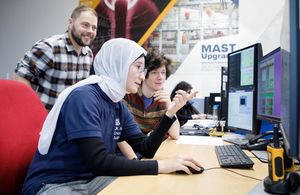Treasury Minister visit highlights MAST-U fusion experiments
- Exchequer Secretary James Cartlidge hails power of future green technologies in strengthening UK’s energy security

UKAEA scientists in the MAST-U Control Room, Culham, Oxfordshire.
- Mega Amp Spherical Tokamak Upgrade (MAST-U) machine tackles further technical challenges for long-term viability of future fusion powerplants
- Experiments test the integration of a high-performance core plasma with strong dissipation in the Super-X divertor configuration
A fusion energy machine vital for the delivery of the UK’s first prototype powerplant has started a crucial second round of experiments to help make ‘star power’ part of the world’s future energy mix.
The United Kingdom Atomic Energy Authority’s (UKAEA) Mega Amp Spherical Tokamak-Upgrade (MAST-U) will run the experiments until the end of January 2023.
Following a visit to UKAEA in Culham, Oxfordshire, earlier this week, Exchequer Secretary to the Treasury, James Cartlidge, said:
“It was an inspiring tour of UKAEA where I was able to see how the UK is developing fusion energy, the process that powers the sun, to generate carbon-free electricity.
“The visit reinforced our commitment to increasing public R&D spending to record levels of £20 billion a year by 2024/25, which includes funding for green tech of the future, like this.”

Exchequer Secretary to the Treasury, James Cartlidge, discusses MAST-U with Prof Ian Chapman, CEO, UKAEA.
MAST-U resembles the shape of a cored apple, in contrast to the ring-shaped record-breaking JET (Joint European Torus). This configuration is currently the preferred design for the UK’s prototype fusion plant, STEP (Spherical Tokamak for Energy Production).
Fusion energy offers the potential of an abundant, inherently safe low-carbon electricity supply. It involves fusing hydrogen particles in a hot gas known as a ‘plasma’ to unlock large amounts of energy.
Operating fusion technologies requires a careful balancing act of controlling extreme heat, gas and magnetic fields, amongst other complex systems.
Last year, MAST-U’s novel exhaust system, Super-X, successfully demonstrated its effectiveness by generating a tenfold reduction in the energy fluxes of the plasma channelled out of the machine, which would allow components in future commercial tokamaks to last longer.
The current run of experiments will seek to investigate how the compact tokamak can combine the benefits from this exhaust using different parameters – higher temperature and pressure, and increased performance caused by operating within a stronger magnetic field – as well as improving shape control of the plasma within the machine.
The core plasma shape will be controlled in real-time and in collaboration with General Atomics.
MAST-U’s experiments will also support the study of detachment physics – reduction of pollution of the core plasma by impurities coming from the wall – for EUROfusion, a consortium of national research institutions located in the EU, Switzerland, UK and Ukraine.
The phased work will investigate how plasma confinement can be optimised for future powerplant conditions.
Commenting on the new experiments, Professor Fulvio Militello, Director of Tokamak Science, UKAEA, said:
“To create fusion in a powerplant, a plasma must be sustained inside a tokamak whilst optimising three conditions: temperature, density and confinement time.
“The new round of experiments conducted by MAST-U will test the integration of a high-performance core plasma with strong dissipation in the Super-X divertor configuration.”
Results from the experiments will contribute to the success of the government-funded STEP programme, which is aiming to demonstrate the feasibility of putting fusion energy on the grid, targeting operations by 2040.
MAST-U achieved its first plasma in 2020 after it was rebuilt to enable higher performance, including longer times plasmas are held in confinement, increased heating power and a stronger magnetic field, alongside its innovative plasma exhaust system.
“UKAEA is exploring pathways to compact and affordable fusion machines and believes the apple-core design holds real promise” continued Professor Militello.
As well as STEP, MAST-U will also aid preparations for ITER – the world’s largest science megaproject, now being built in the South of France, which intends to demonstrate the viability of fusion on an industrial scale.